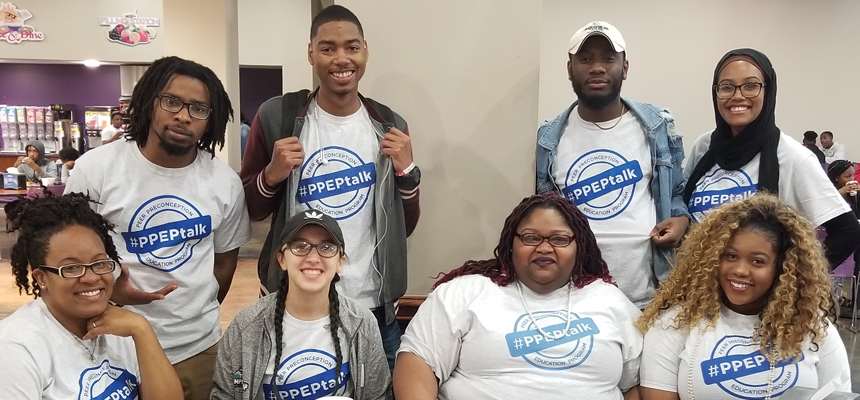Public health team tackles infant mortality problem
College student Tassanee Harris isn’t planning to start a family anytime soon, but she’s taking steps now to help ensure that when she’s ready, she can be at her healthiest and give her future children the best start possible.
Harris, a junior at Paul Quinn College in Dallas, is an advisory board member for #PPEPtalk, a Peer Preconception Education (PPE) program led by a UNT Health Science Center public health team and funded by the Texas Department of State Health Services.
Sponsored by a state grant since 2015, the program is managed by Principal Investigator Marcy L. Paul, PhD, Assistant Professor in the UNTHSC School of Public Health, and PPE Project Coordinator Lesley Jimenez, MA, MPH, CPH.
So far, the program has reached more than 900 students at historically black colleges and universities (HBCU’s) in Texas, using peer relationships to spread preconception information and Life Course health messages, in an effort to break the cycle of infant mortality among African Americans.
“Data shows that infants born to African American mothers are more than twice as likely to die during their first year of life,” Dr. Paul said. “And research indicates that by improving a woman’s overall health throughout her lifetime, birth outcomes, and the health of her children and their children can be improved.”
PPE uses a “train the trainer” approach, certifying student peer educators, who then introduce programs and activities on their campuses related to physical and mental health, sexual health, healthy relationships and preconception wellness.
“The goal is to get the campus healthy before they decide they are ready to start a family and have kids,” Harris said.
At Paul Quinn, the program has been important in helping students who live away from home and might not always practice healthy behaviors.
“We offer stress relief programs. We distribute condoms and host speakers on sexual health. We host ‘Get into Shape’ events, yoga classes and nutrition programs where we talk about eating healthy on a college student’s budget,” Harris said. “Our most successful events have been Campus Open Mic Nights, where students have the voice. Anyone can take the microphone to talk about mind, body and soul in any way they want. People sing, dance, share poetry, it’s up to them, and it gets pretty creative.”
The programs have been so well received on campus, Harris said, that their PPE group won Paul Quinn Organization of the Year for 2017.
“The program is much needed on our campus as well as the community, and it’s currently in the works to also reach out to surrounding zip codes near our school,” she said.
Project Coordinator Jimenez travels the state to connect with the nine Texas HBCU’s, and the students themselves communicate across campuses to share ideas that have worked for them.
“The question we are often asked is, if I’m not planning to have a baby, why would I care,” Jimenez said. “Students are surprised to learn how their health behaviors now can impact the future, and for male students, it also involves building awareness of how they, too, are a part of preconception health.”
Dallas neonatologist Terri L. Major-Kincade, MD, has been involved with PPE since 2012, helping to develop the curriculum with March of Dimes, leading workshops and serving as faculty and mentor. She was the first to present PPE in Texas when she trained students at her alma mater, Prairie View A&M University.
“Some of the biggest accomplishments of the program so far have been the sheer number of students we have been able to train and the number of HBCU’s we have made connections with,” she said. ”One of my favorite classes involved the football team at Texas College in Tyler. It was really cool to see football players getting excited about playing the Life Course Game, holding tiny preterm baby models, learning about sexual health and how it affects babies, and offering suggestions for increasing awareness on campus from the male point of view. Since the program joined UNT Health Science Center, we have been able to reach even more students and bring in additional institutions across Texas to help share the message.”






Social media